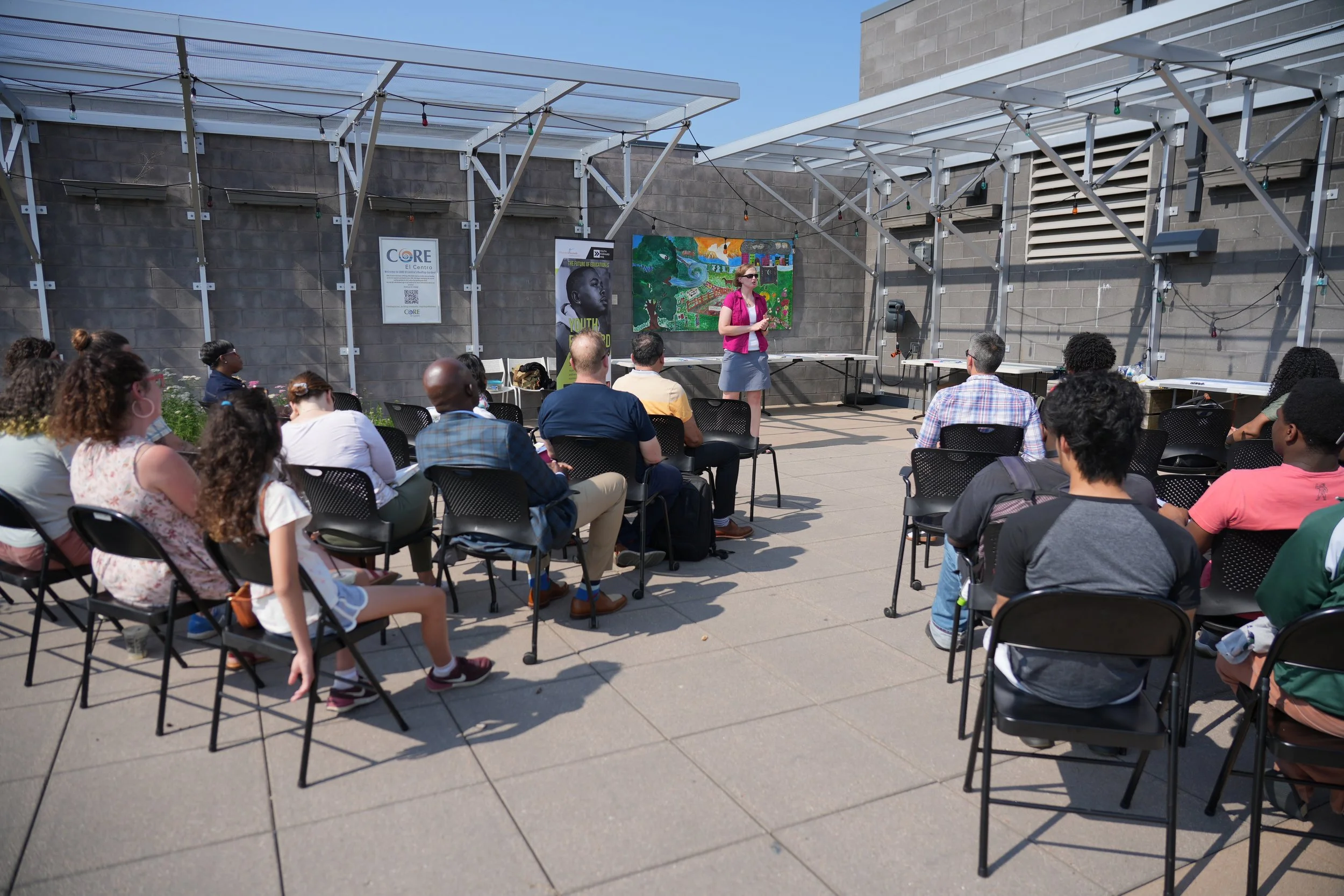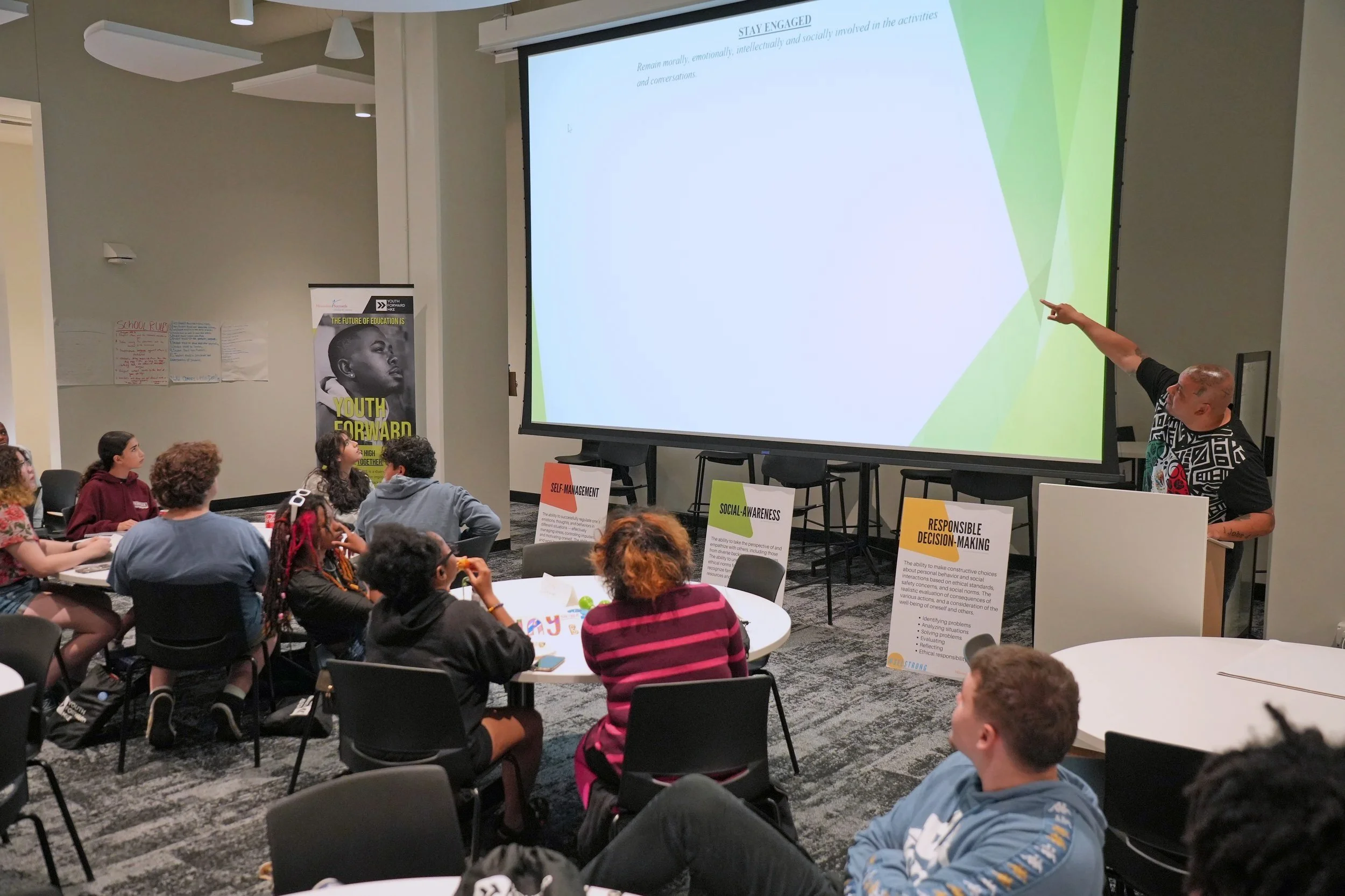Youth Forward MKE’s March Meeting: Strengthening Youth Leadership and Impact
On March 26, Youth Forward MKE hosted a powerful gathering of youth and community partners, all committed to creating lasting change.
Maria Hamidu, Milwaukee Succeeds’ high school success project manager, opened the meeting by acknowledging the challenges we face – loss, rapid change and uncertainty – but also emphasizing the coalition’s resilience. "We're not just reacting to systems that weren’t made for young people. We're reimagining them. Together, we are carving out a path that centers youth voice, values youth leadership and treats their brilliance as the asset it is."
With a focus on data and continuous improvement, the meeting offered an opportunity to reflect on the progress made, identify areas for growth and plan the next steps in amplifying youth voice.
The Latine Youth Achievement Report
Made possible by a capacity-building grant from Milwaukee Succeeds, the Latine Youth Achievement Report is a powerful tool for understanding and supporting the young people in our city. Led by Dr. Gabriel Velez and Saúl Lopez of Marquette University’s Blest Hub, in partnership with Data You Can Use, the report builds on the Black Youth Achievement Report released in 2023. That report highlighted key themes such as population trends, barriers to aid and the need for authentic representation. Now, the Latine report is continuing that momentum – uplifting youth experiences, dismantling negative stereotypes and celebrating areas of achievement.
“There were a couple specific questions that we looked to address,” explained Dr. Velez. “What are the areas in Milwaukee where Latine youth are improving and achieving success? And then what are the recommendations from people in Milwaukee most affected by the data?”
The research process involved three key steps: data gathering with a focus on local and national figures, data chats that provided community-driven insights and a thematic analysis that identified overarching trends.
Already, the preliminary findings are sparking important conversations. Wellness emerged as a key concern, with only 60% of Hispanic students having a trusted adult to talk to, compared to 72% of their non-Hispanic peers. Education was another critical focus, with discussions on rising graduation rates, chronic absenteeism, the move toward technical education and the lingering impact of COVID-19. In terms of recommendations, participants stressed the need for mentorship, third spaces like community centers, and financial support for education and job training.
Dr. Velez emphasized that this is not a static report – it’s a living document that will evolve as conversations deepen and cultural landscapes shift. The goal is not just to present the data but to drive action, ensuring that every young person in Milwaukee has the support they need to succeed. (Stay tune for the full report later this year!)
Insights from our Coalition Survey
“Data helps us make informed decisions, track what's working and shine a light on the areas where we still have room to grow,” said Maria. “It helps us hold ourselves accountable to the outcomes we want to see in schools and communities, and in the lives of young people.”
That’s why, last fall, we invited the coalition to share their experiences, insights and visions for the future. Their responses were overwhelmingly positive, reflecting a deep sense of engagement and a commitment to shaping a brighter future for Milwaukee’s youth.
Our workgroups are at the heart of this movement, providing spaces for deep conversations, meaningful collaboration, and new ideas to amplify youth voice and drive action. Respondents also expressed confidence in Youth Forward MKE’s ability to improve education in Milwaukee. They highlighted the coalition’s accomplishments, praised our follow-through and expressed hope for the future.
Still, we know there’s more to do – like elevating our work to local and state leaders and increasing awareness beyond the coalition. Moving forward, the feedback we've gathered will help us build on our strengths and drive the improvements needed to deepen our impact across Milwaukee.
The Autonomous Youth Council
Data drives our coalition, but it’s also at the heart of our initiatives. The Autonomous Youth Council (AYC) is a prime example. This innovative opportunity is allowing youth the chance to hone their talents and potential, then put them into action. The journey started last year with a 4-week summer session, followed by a fall academy focused on life skills and leadership development. Now, new data from the fall series is allowing us to examine the impact of our efforts and explore ways to better serve our young leaders.
"We aim to catch deficiencies quickly, to make changes in real time, to ensure the best possible experiences and outcomes for all," explained Kristin Kappelman, Milwaukee Succeeds’ director of research.
Retention for the fall series remained high, with 24 of 26 youth completing the academy (92%), but attendance dropped significantly – from 92% in summer to 62% in fall. Hosting the trainings on Saturdays during the busy school year and holding them online – first hybrid, then virtually – contributed to the slump, as well as an overarching drop in engagement.
Yet several bright spots bolstered the experience. Compensation and strong relationships emerged as highlights. Youth also found merit behind the budgeting and job readiness sessions, despite some struggling to engage with data-driven topics. Events such as the EmpowerED Convening and the Winter Jam provided opportunities for connection, yet youth weren’t always clear on their role.
“We're on a growth journey,” said Kristin. “We're hoping to take all that we learned and package some of our best practices, but also some of our stumbles.” The ultimate goal is to provide a guidebook for engaging with youth, which other organizations can apply as they continue to shift power to young people.
AYC Partner Placements
Now, our AYC members are ready to take their training to the next level: partner placements. These year-long assignments will provide them with meaningful, hands-on experience in decision-making roles. The placement sites include 8 dynamic organizations, where youth will join boards or projects that aim to elevate youth voice – like the park redevelopment project at the Milwaukee Parks Department.
“My hope is that we'll be able to tap the expertise of our young people,” said Joseph Kaltenberg, MKE Parks manager, “but then also for them to be able to integrate into our reconstruction engagement process and potentially take the lead on specific elements of that – whether it’s park renaming or a specific design element.”
At Your Move MKE, youth will sit on the board and Healing Hubs table to help create solution-based approaches to community issues. According to Restorative Justice Facilitator SilkE: “I’m really excited about…the opportunity to get the youth perspective on what's most important and figuring out what the youth want. How do we make this valuable to them?”
Turning Data into Action
Throughout the meeting, one theme remained clear: Data is not just a tool for measurement – it is a guide for meaningful action. By leveraging insights from reports, surveys and evaluations, Youth Forward MKE is not only identifying challenges but actively building solutions.
As Maria reminded the coalition: "This work may feel heavy in our current times, but the vision we carry is both necessary and absolutely possible. So let's carry it together."




